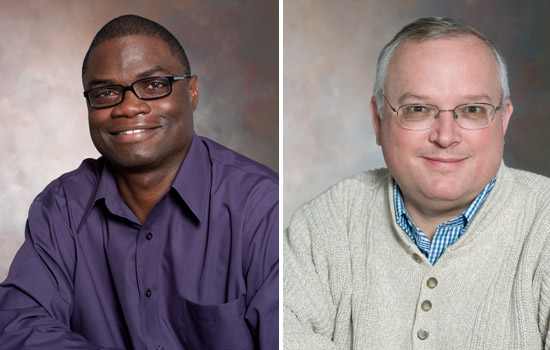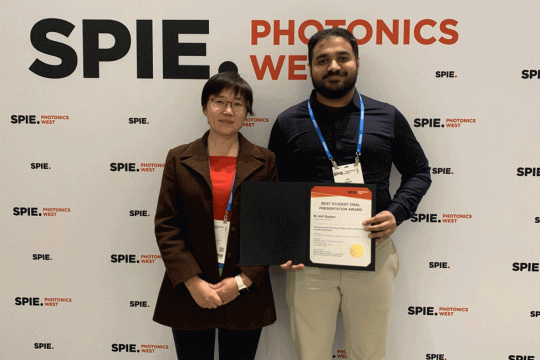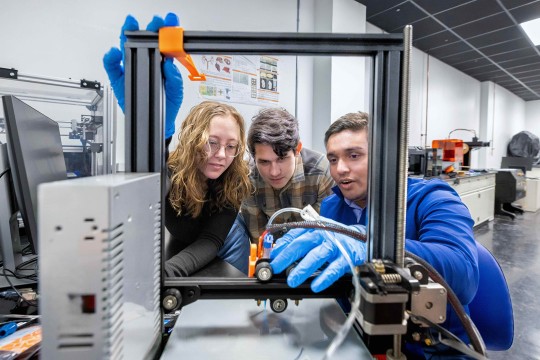RIT partners with green biotech company
Collaboration will give RIT students experience in biotech industry
André Hudson and Michael Savka
A collaboration between Rochester Institute of Technology’s Thomas H. Gosnell School of Life Sciences and Sweetwater Energy Inc. will give students experience with the Rochester-based company that has a sweet and sustainable niche.
Sweetwater Energy provides its industry partners with a concentrated plant-sugar mixture for production of biofuels, biochemicals and bioplastics. The growing company seeks to develop a pipeline of RIT students with industrial biotechnology skills necessary for converting plant materials to sugar and a ready source of energy. The relationship could lead to co-ops or internships and, perhaps, full-time employment for some RIT students.
Biochemist André Hudson and microbiologist Michael Savka, professors in RIT’s Gosnell School of Life Sciences, work with students to characterize properties of the sugar-water mixtures that promote conversion to biofuels and other energy-related products.
RIT alumni Benjamin Stauber, microbiologist, and Hannah Szpaicher, biochemist, at Sweetwater Energy—both 2012 graduates from RIT’s biotechnology and molecular bioscience program—reached out to their former professors, Hudson and Savka, when Sweetwater Energy was located in the RIT Incubator. The company is now based in the city of Rochester and has built a demonstration cellulosic plant on-site.
“What’s novel and intriguing about the Sweetwater approach is the sustainability factor,” says Hudson. “It’s using biomass to make sugar water from plant materials that are generally not of interest to growers.”
Adds Savka, “Sweetwater is using the vegetative portion of soybean, corn, wheat and other plants. It’s a sustainable model because using this biomass won’t compete with food production.”
Cellulosic sugars are primarily isolated from the cell walls of plants. The same fermentation process used to make wine converts these sugars into biofuels like ethanol.
“You can take the sugar water that Sweetwater makes and do different things with it, such as make ethanol,” Hudson says. “You can also isolate other compounds from the plant materials to facilitate conversion to long chain lipids for biodiesel or polymers for bioplastics.”
Ace Ethanol in Wisconsin, Front Range Energy in Colorado and Naturally Scientific in the United Kingdom use Sweetwater’s sugar water as a feedstock. They add catalysts, such as a genetically modified or naturally occurring microorganism, to convert the feedstock into a product, Savka says.
Weaning the United States off oil dependency and developing alternate and renewable fuel sources is a national priority for the Obama administration. It seeks to reduce greenhouse gas emission by 80 percent by 2050 and make the nation a leader in reversing climate change.
“There’s a huge push to develop bioenergy and to develop plants that you can grow on subprime soil,” Hudson says. “The population is growing. You can’t grow the crop that you ultimately want ethanol from on the same land that you are going to grow a crop that you are going to feed people with.”
For more information about Rochester Institute of Technology professors André Hudson and Michael Savka and their research, go to: André Hudson; and Michael Savka.












